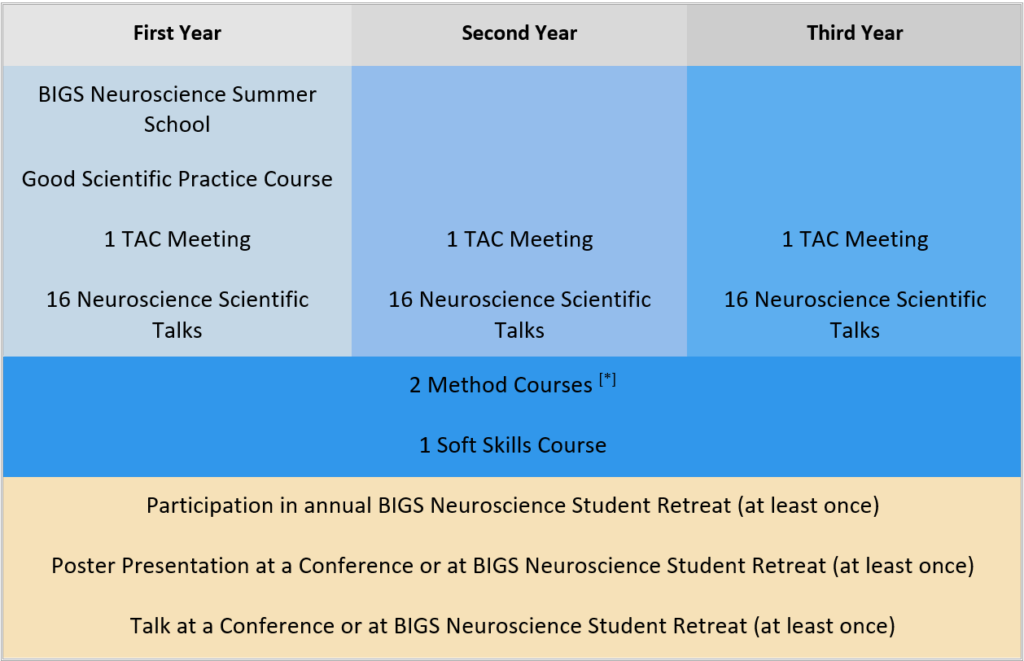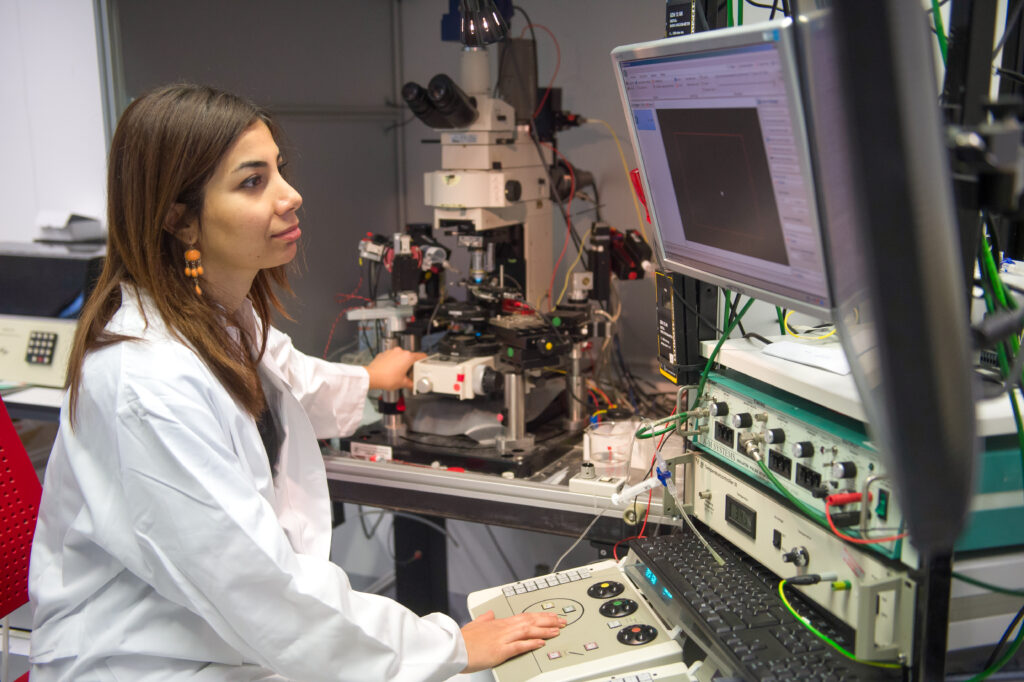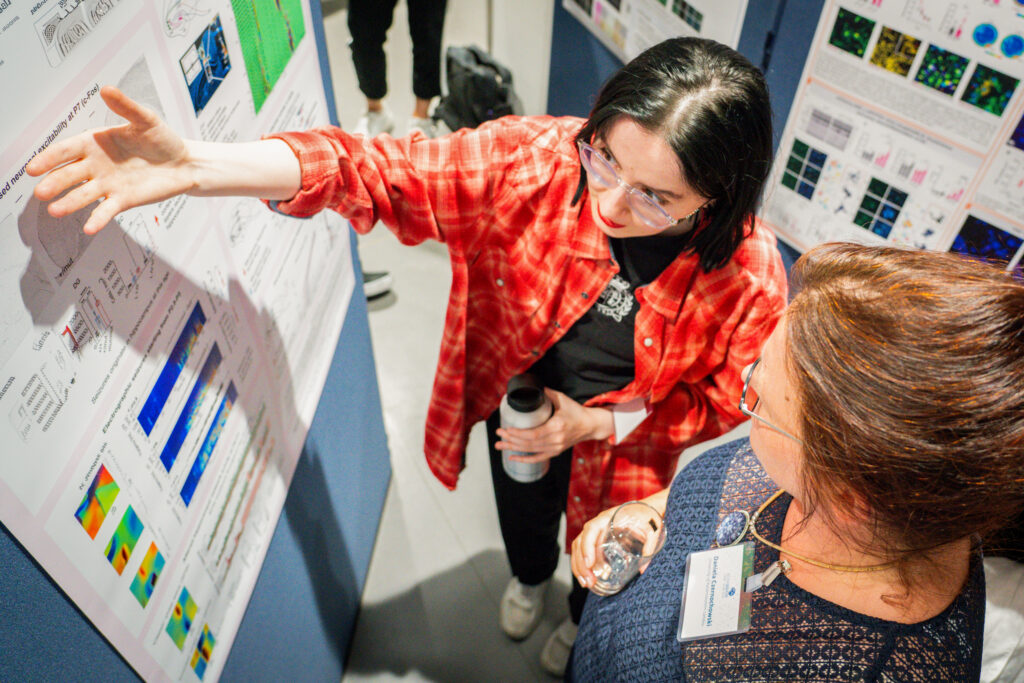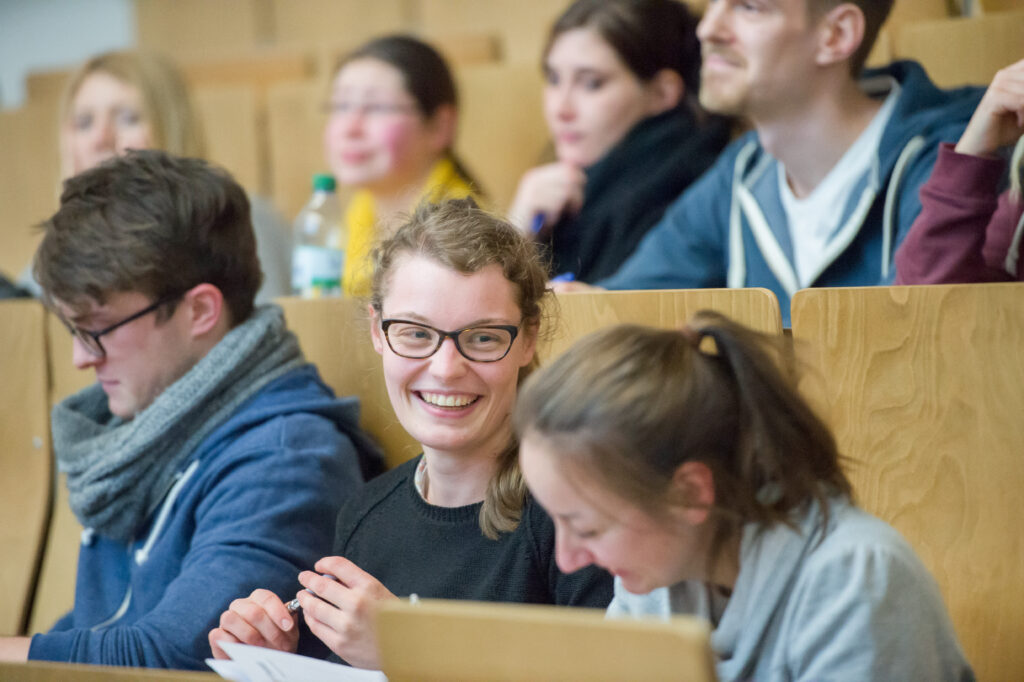BIGS Neuroscience strives to ensure that your graduate experience matches your needs and aspirations, prepares you for leadership roles in academic research and beyond, and maximizes your passion for neuroscience.
Central to your doctoral training is conducting scientific research in one of the participating research groups. To promote your research progress and to complement hands-on laboratory experience, BIGS Neuroscience offers a comprehensive and advanced curriculum of practical courses in cutting-edge technologies, method seminars and scientific presentations by renowned international scientists. All courses are conducted in English, and participation is free of charge.
To gain a doctorate at the University of Bonn, your thesis must demonstrate significant scientific advancements.
Curriculum overview




BIGS Neuroscience Educational Programme
The doctoral programme is designed to give you the opportunity to expand your neuroscience research skills as well as your personal transferable skills. Training measures are complemented by annual thesis advisory committee (TAC) meetings, comprehensive measures for career development and support for scientific networking. In the following we would like to introduce the individual training components to you.
The aim of the summer school is to introduce BIGS Neuroscience PhD students early in their careers to the neuroscience community in Bonn, its research topics and methods.
Core topics of the summer school are cellular and synaptic neuroscience, development, circuits, behaviour, diseases of the nervous system and psychology. The summer school days are divided into morning lectures and matching afternoon lab visits. During the lab visits we offer hands-on experience and you can explore different research areas of your choice and get to know the scientists and the research institutes. You will also have time for networking.
BIGS Neuroscience offers a wide range of courses that focus on experimental methods, basic neuroscience knowledge or programming. BIGS Neuroscience cooperates with core facilities, research institutes and individual faculty members for its methods courses. The following courses are examples of the current course programme.
Core facility methods courses
Courses with lectures and exercises
Machine Learning courses on offer
Attendance of scientific talks is a central part of the BIGS Neuroscience curriculum. The vibrant Bonn Neuroscience community invites many distinguished guest speakers. Joining these talks allows BIGS Neuroscience students to learn about current developments in neuroscience research. Students without a neuroscience background have the option to attend lectures offered by the M.Sc. Neurosciences.
Local talks can be found on the following webpages:
Compliance with the principles of good scientific practice is essential to all scientific work. We cooperate with the German Reference Centre for Ethics in the Life Sciences to offer our PhD students a lecture series on good scientific practice based on the DFG´s Code of Conduct „Safeguarding Good Research Practice“.
The lecture series covers the following and additional topics:
Introduction to the Principles of Ethics of Science and its History
Foundations and Approaches in Ethics and Ethics of Science
Research with Humans
Neuroenhancement
Animal Ethics and Research on Animals
Environmental Ethics and Biodiversity
Participation in soft skill courses complements the skills acquired in academic research. They help prepare BIGS Neuroscience PhD students for a successful career following their doctorate. Many different soft skills courses are available at the Bonn Graduate Center which offers a specific line of courses exclusively to doctoral students of the University’s BIGS programmes.
BIGS Neuroscience offers the following primarily research related soft skills courses:
BIGS Neuroscience requires doctoral candidates to regularly convene with a Thesis Advisory Committee (TAC) to ensure ongoing feedback on the progress of their thesis projects. Candidates are expected to present a progress report to the committee at least three times throughout their doctoral studies, typically once per year.
How to carry out a TAC Meeting?
A TAC Meeting form has been developed to structure the discussion of the student’s research progress. In addition, this form provides a record of the student’s achievements to date and recommendations for future research. You can download the form as a Word-file. In our TAC Meeting guidelines you can find additional advice on how to prepare a TAC Meeting. Following the TAC Meeting, the completed and signed document has to be scanned and uploaded to the BIGS Neuroscience internal platform in the “Achievements” section.
A key aim of BIGS Neuroscience is to encourage interaction and collaboration among our students through regular retreats, student conferences and social events.
Conference participation
Doctoral students are required to present their data in the form of a poster and an oral presentation at a national or international conference or workshop at least once during their doctoral studies.
BIGS Neuroscience Student Retreat
The BIGS Neuroscience Student Council organises an annual student retreat, which is a great opportunity for students to get feedback on their research from their peers and to learn more about the various neuroscience projects in Bonn.